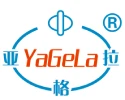Hey there! As a supplier of welded steel tubes, I often get asked about the tensile strength of these tubes. So, I thought I'd take a moment to break it down for you.
First off, let's talk about what tensile strength actually means. Tensile strength is the maximum amount of tensile (pulling) stress that a material can withstand before it breaks or fails. In the case of welded steel tubes, this is a crucial property because these tubes are often used in applications where they'll be subjected to pulling forces, like in construction, automotive, and manufacturing industries.
The tensile strength of welded steel tubes can vary quite a bit depending on several factors. One of the main factors is the type of steel used. There are different grades of steel, and each grade has its own unique properties, including tensile strength. For example, mild steel is a common choice for welded steel tubes. Mild steel typically has a relatively lower tensile strength compared to some other types of steel. You can check out more about Mild Steel Round Bar on our website.
On the other hand, stainless steel is another popular option for welded steel tubes. Stainless steel offers better corrosion resistance and often has a higher tensile strength than mild steel. We have a great selection of Welded Stainless Steel Pipe Tube that you might be interested in. And if you're looking for something even more specialized, our Stainless Steel Welded Seamless Pipe Tube combines the benefits of welding and seamless construction, with excellent tensile strength to boot.


The manufacturing process also plays a big role in determining the tensile strength of welded steel tubes. The quality of the welding can have a significant impact. A well - welded joint will distribute stress more evenly across the tube, increasing its overall tensile strength. If the welding is done poorly, there could be weak points in the tube where stress concentrations occur, which can lead to premature failure under tension.
The thickness of the tube wall is yet another factor. Generally, thicker - walled tubes have higher tensile strength because there's more material to resist the pulling forces. However, thicker tubes also weigh more and can be more expensive, so it's a balance that needs to be struck based on the specific application.
Let's take a closer look at how we test the tensile strength of our welded steel tubes. We use standardized testing methods. Usually, a sample of the tube is cut and prepared according to specific dimensions. Then, it's placed in a testing machine that slowly applies a pulling force until the tube breaks. The machine records the maximum force applied, and from that, we can calculate the tensile strength of the tube.
In the construction industry, for example, welded steel tubes with high tensile strength are used in building frames, bridges, and other structures. These tubes need to be able to support heavy loads and resist the forces of nature, like wind and earthquakes. In the automotive industry, they're used in exhaust systems, chassis components, and other parts that need to withstand mechanical stress.
If you're in the market for welded steel tubes, it's important to know what tensile strength you need for your application. You don't want to over - specify and end up paying more for a tube with a higher tensile strength than you actually need. But at the same time, you definitely don't want to under - specify and risk having a tube that fails under normal operating conditions.
We've spent years perfecting our manufacturing processes to ensure that our welded steel tubes meet the highest standards of quality and tensile strength. Our team of experts is always on hand to help you choose the right tube for your needs. Whether you're a small - scale DIY enthusiast or a large - scale industrial manufacturer, we've got the products and the knowledge to assist you.
So, if you're interested in learning more about our welded steel tubes or need help determining the right tensile strength for your project, don't hesitate to reach out. We're here to make sure you get the best product for your money and that it performs exactly as you need it to. Contact us today to start the conversation about your welded steel tube requirements.
References
- ASTM International. (Year). Standard test methods for tension testing of metallic materials. ASTM E8/E8M - XX.
- ASME Boiler and Pressure Vessel Code. (Year). Rules for construction of pressure vessels. Section VIII, Division 1.




